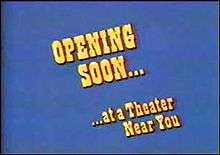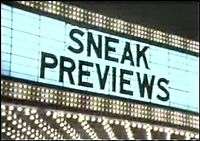Sneak Previews
| Sneak Previews | |
|---|---|
|
Title card from Sneak Previews. | |
| Also known as |
'Opening Soon at a Theater Near You (1975–1977) |
| Genre | Film review |
| Created by | Thea Flaum[1] |
| Presented by |
Roger Ebert (1975–1982) Gene Siskel (1975–1982) Neal Gabler (1982–1985) Jeffrey Lyons (1982–1996) Michael Medved (1985–1996) |
| Country of origin | United States |
| Original language(s) | English |
| Production | |
| Location(s) | Chicago, Illinois |
| Running time | 30 minutes |
| Production company(s) | WTTW |
| Release | |
| Original network | PBS |
| Original release | September 4, 1975 – 1996 |
Sneak Previews was an American film review show,[1] running for over two decades on Public Broadcasting Service (PBS). It was created by WTTW, a PBS affiliate in Chicago, Illinois. It premiered on September 4, 1975 as a monthly local-only show called Opening Soon at a Theater Near You, and was renamed in 1977 when it became a biweekly show airing nationally on PBS. By 1979, it was a weekly series airing on over 180 stations, and was the highest rated weekly entertainment series in the history of public broadcasting.[1] The show came to an end in 1996 and is no longer aired.
Format
The show featured two critics who would present short clips of movies in current release then debate the merits of the films, energetically defending their remarks if the other critic disagreed. A designated "dog of the week" was also featured, with "Spot the Wonder Dog" barking on cue as an introduction.[1]
Episodes from the first seven seasons ended with one of the hosts saying "See you at the movies." Many episodes from season eight ended with the hosts' reminder to "save us the aisle seats."
Some episodes were known as Take 2 shows which replaced the review of recently released films with themed topics such as "Women in Danger", and slasher films of the 1970s and early 1980s. On one occasion, Siskel and Ebert invited the viewer into a day in their lives as they screened films.
History

The show first aired in 1975 on a monthly basis under the name Opening Soon at a Theater Near You, and after two successful seasons, was renamed Sneak Previews.[1] The show originally featured Roger Ebert, a film critic from the Chicago Sun-Times and Gene Siskel, a film critic from the Chicago Tribune.
The two newspapers were competitors, and so were Siskel and Ebert. As Ebert wrote after Siskel's death in 1999:
We both thought of ourselves as full-service, one-stop film critics. We didn't see why the other one was quite necessary. We had been linked in a Faustian television format that brought us success at the price of autonomy. No sooner had I expressed a verdict on a movie, my verdict, than here came Siskel with the arrogance to say I was wrong, or, for that matter, the condescension to agree with me. It really felt like that. It was not an act. When we disagreed, there was incredulity; when we agreed, there was a kind of relief. In the television biz, they talk about "chemistry." Not a thought was given to our chemistry. We just had it, because from the day the Chicago Tribune made Gene its film critic, we were professional enemies. We never had a single meaningful conversation before we started to work on our TV program. Alone together in an elevator, we would study the numbers changing above the door.[2]
The tension between the two men made the show's production difficult and time-consuming at first:
Making this rivalry even worse was the tension of our early tapings. It would take eight hours to get one show in the can, with breaks for lunch, dinner and fights. I would break down, or he would break down, or one of us would do something different and throw the other off, or the accumulating angst would make our exchanges seem simply bizarre. There are many witnesses to the terror of those days. Only when we threw away our clipboards and 3x5 cards did we get anything done; we finally started ad-libbing and the show begin to work. We found we could tape a show in under an hour.[2]
Over time the two men became close personal friends while remaining professional rivals, and Ebert described their relationship before Siskel's death as "no one else could possibly understand how meaningless was the hate, how deep was the love".[2]
Post-Siskel and Ebert
The success of the show led WTTW to decide to syndicate it to commercial television.[1] Siskel and Ebert left Sneak Previews in 1982, citing contractual differences with WTTW. They indicated that they were offered a contract and asked to "take it or leave it", and they chose the latter option.[1] The two critics were soon featured in At the Movies with Gene Siskel and Roger Ebert, a similar show created with Tribune Entertainment and replaced in 1986 by a Disney-produced long-running show first known as Siskel & Ebert & the Movies.
In 1982, WTTW quickly signed Neal Gabler and Jeffrey Lyons as replacements for Siskel and Ebert on Sneak Previews. Each post-1982 episode ended with the catch phrase "Don't forget to save us the aisle seats." Neal Gabler left Sneak Previews in 1985, citing philosophical differences with the direction of the show,[3] and was replaced by Michael Medved. Before replacing Gabler, Medved had cameo appearances on the show, presenting the "Golden Turkey Awards," based on the book, and a variation of Siskel & Ebert's "Spot the Wonder Dog/Dog of the Week."
Cancellation
Although Sneak Previews stayed on the air for 14 years after Ebert and Siskel left, it was never as popular as it was during their tenure.[3] The show changed its title to Sneak Previews Goes Video in 1989 and concentrated on home video releases but then went back to its old title in 1991. PBS continued to air the show until the 1995–1996 season, and then canceled it.
See also
References
- 1 2 3 4 5 6 7 "SISKEL and EBERT". Museum of Broadcast Communications. Retrieved 2010-11-30.
- 1 2 3 Ebert, Roger (2009-02-17). "Remembering Gene". Chicago Sun-Times. Retrieved April 5, 2013.
- 1 2 "A Siskel & Ebert & Roeper timeline". Chicago Tribune. July 22, 2008. Retrieved 2010-11-30.
External links
- Sneak Previews at the Internet Movie Database
- Sneak Previews at TV.com
- Sneak Previews at epguides.com
